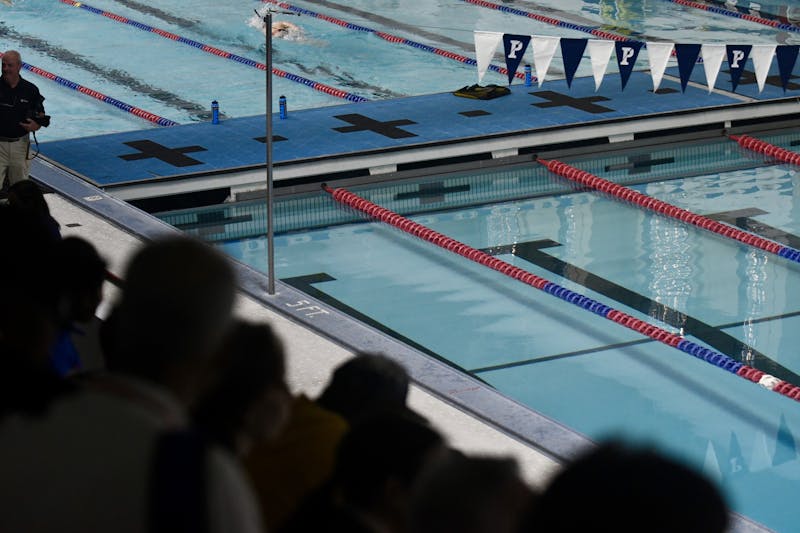The University Board of Trustees wrapped up its annual fall meetings on Friday with the stated meeting and the dedication of the Women's Walkway and Class of '49 Generational Bridge over 38th Street.
About 65 members of the full Board of Trustees, the University's main decision-making body, attended meetings on Thursday and Friday at the Inn at Penn to discuss the endowment, security on campus and student dining, among other topics.
The full Board of Trustees meets each fall, winter and summer for a series of committee meetings.
The trustees approved 25 resolutions at the stated meeting, ranging from appreciation for fellow board members to recent appointments to administrative positions.
Provost Robert Barchi reported on the academic initiatives that the University has undertaken this semester. Executive Vice President John Fry delivered the financial report and spoke about how the University has been affected by the recent economic slowdown.
Chairman of the Board of Trustees James Riepe said that despite the recent success the University has had with its endowment, Penn must be cautious with the currently fluctuating market.
"The most difficult thing for us is going to be an economy that was already in decline before September 11," Riepe said. "I think that's going to be the biggest challenge for us short term. Fundraising starts to become more of a challenge."
Friday's stated meeting was followed by the bridge dedication and a luncheon featuring the presentation of the Beacon Award, which celebrates the contribution of a woman to the Penn community, to University President Judith Rodin at Wynn Commons.
On Thursday morning, members of the Student Life Committee met to talk about the future of Penn's study abroad programs and the problems with Dining Services.
According to Vice President for Business Services Leroy Nunery, only 40 percent of sophomores signed up for meal plans this fall, down from 70 percent last year. In addition, only 2 percent of graduate students currently have meal plans.
Nunery said the drop in student meal plans was partly due to the rise of viable off-campus vendors like The Freshgrocer and Philly Diner. He said the University is looking into ways to allow students to use their PennCards at off-campus locations.
"We're operating at break-even right now," Nunery said. "We think there is an opportunity to brand the Penn dining service with [outside vendors.] Our antiquated technology is not yet up to speed."
During the meeting, several trustees expressed concern for the safety of Penn students studying abroad, especially in Middle Eastern countries. Some suggested that the University consider pulling Penn students out of Egypt and Israel.
However, Barchi said that the University has to consider the academic missions of the programs before making any decisions.
"I think we will be less of an institution if we are not as international as we are now," Barchi said. "These programs are serving a purpose. One could argue that students are even safer in some of these programs than they are on campus."
The Neighborhood Initiatives Committee also met on Thursday morning to discuss public safety on campus and the Penn-assisted public school.
At a luncheon on Thursday afternoon, the Board of Trustees was presented with the news that the endowment had bounced back from its disappointing fiscal year 2000 numbers with a 6 percent gain in Financial Year 2001.
Riepe said the recovery of Penn's endowment is payback for last year's under-performance.
"We knew last year that the kind of environment we had experienced was not sustainable, and that those that did poorly during that period on a relative basis would do better once the market started turning," he said.
Riepe added that Penn's endowment has done better than its peers thus far in the new fiscal year despite the economic downturn.
"Investment is a two-edged sword," he said. "It has return and it has risk, and we're now in the risk part of the cycle. Our portfolio is assembled in such a way that it should do better in a more difficult environment."
At the Budget and Finance Committee meeting, Vice President for Finance and Treasurer Craig Carnaroli presented data that showed stable to improving trends in the University's financial position. Health System Chief Financial Officer Peter DeAngelis presented similar data, showing that Penn's health system is on the road to recovery.
"We're certainly not the best, but we're at benchmark for operating performance," DeAngelis said.
The Daily Pennsylvanian is an independent, student-run newspaper. Please consider making a donation to support the coverage that shapes the University. Your generosity ensures a future of strong journalism at Penn.
DonatePlease note All comments are eligible for publication in The Daily Pennsylvanian.







